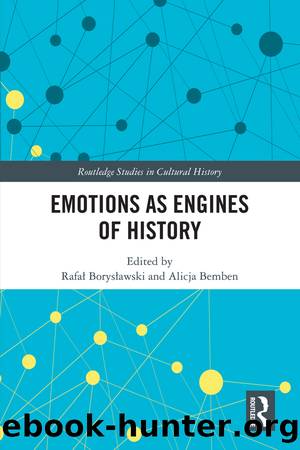Emotions as Engines of History by Rafał Borysławski Alicja Bemben

Author:Rafał Borysławski, Alicja Bemben [Rafał Borysławski, Alicja Bemben]
Language: eng
Format: epub
Tags: History, Europe, General, Modern, Social History
ISBN: 9781003019015
Google: ONqjzgEACAAJ
Publisher: Routledge
Published: 2021-09-23T17:15:22+00:00
This interpretative formulation effectively recasts the Sturlung generation and all the subsequent generations as survivors of that violence and bearers of those cataclysmic memoriesâto the point that the Sturlung Age itself becomes a flag symbol of Icelandâs national trauma. The coinage of the Sturlung Age qua âageâ may well have been Einar Ãlafur Sveinssonâs attempt to process and articulate the disturbing zeitgeist of his own time. Seen in this light, the designation of the Sturlung period as a discrete âageâ emerges not so much as a projection but as seeking of a perspective, bringing the past in dialogue with the present and interrogating it for insights and nuances that such cross-pollination may bring. For a historian, the concerns and issues of oneâs time frame oneâs processing of other eras. The fourteenth-century compilers of Sturlunga saga manuscripts, after all, endeavoured to do the same. Joining them in embracing the sagaâs narrative impact, Einar Ãlafur Sveinsson becomes a Nietzschean abyss-gazer himself, whose descriptions of the sagaâs dream scenes betray his own fascinations: âThere seems to open up before us a view into some gigantic void of endless vastness. Into it are projected images from the world of the day, lifeless as wraiths, distorted like elongated shadows, which yet become fraught with a magic life and mingle with the monsters of ancient myth and the demons of Christian visionsâ (1953, 98). As Einar Ãlafur Sveinsson abandons the usual tenets of literary criticism when his immersion takes over, he becomes a reader engrossed in the saga, an experiencing participant, no longer able to disentangle himself from the emotions these texts evoke. No longer speaking for medieval audiences, it is his own reaction that he channels as he engages with this content, to the point that it becomes hard to tell him apart from the saga characters visited by spectral apparitions. âA hidden, chilling anxiety fills the recesses of the mind and breaks out in dreams, visions, and portents,â he writes, âfull of wonders from the dark wilderness of the imaginationâ (1953, 98).
Strikingly, what emerges in this dynamic is the figure of the historian as a world-builder. It is out of their subjective experience of and participatory engagement with the source material that the historian creates the edifices for an interpretative model which frames and shapes the readings it yields: a world of personal meaning comes into being. This phenomenological repositioning of historiography as a subjective endeavour, negating its presumed objectivity, comes as no surprise if we recall that the phenomenological method itself was emerging in the early twentieth century out of its philosophersâ personal struggles to come to terms with overwhelming historical events. Framed by the horrors of the two world wars, the discourses of this critical-theoretical current have come to interpret the act of writing history as a trauma response. It is worth noting that some of this methodâs most prominent authors were directly impacted by the unfolding catastrophes and experienced them firsthand. Martin Heidegger, for instance, served on the front lines in
Download
This site does not store any files on its server. We only index and link to content provided by other sites. Please contact the content providers to delete copyright contents if any and email us, we'll remove relevant links or contents immediately.
The European Opportunity by Felipe Fernández-Armesto(571)
The European History Highway: A Guide to Internet Resources by Dennis A. Trinkle Scott A. Merriman(535)
Morgan Kaufmann Digital Watermarking and Steganography by Ingemar Cox Matthew Miller Jeffrey Bloom Jessica Fridrich Ton(529)
The Seven Wonders of the Ancient World by Michael Denis Higgins(521)
Hyperculture by Byung-Chul Han(511)
European Security without the Soviet Union by Stuart Croft Phil Williams(511)
European Security in a Global Context by Thierry Tardy(507)
The Routledge companion to Christian ethics by D. Stephen Long Rebekah L. Miles(499)
Get Real with Storytime by Julie Dietzel-Glair & Marianne Crandall Follis(445)
Hudud Al-'Alam 'The Regions of the World' - a Persian Geography 372 A.H. (982 AD) by V. V. Minorsky & C. E. Bosworth(439)
Tibetan Studies in Comparative Perspective by Chih-yu Shih Yu-Wen Chen(437)
Gorbachev And His Generals by William C. Green(429)
Governance, Growth and Global Leadership by Espen Moe(428)
CliffsNotes on Fitzgerald's The Great Gatsby by Kate Maurer(413)
How Languages Are Learned 5th Edition by Patsy M Lightbown;Nina Spada; & Nina Spada(409)
The Oxford History of the World by Fernández-Armesto Felipe;(388)
The Egyptian Economy, 1952-2000 by Khalid Ikram(387)
Oral Poetry and Narratives from Central Arabia: The Poetry of Ad-Dindan : A Bedouin Bard in Southern Najd (Studies in Arabic Literature, Vol 17) (English and Arabic Edition) by P. M. Kupershoek P. Marcel Kurpershoek(368)
The Oxford Handbook of the Incas by Sonia Alconini(365)
